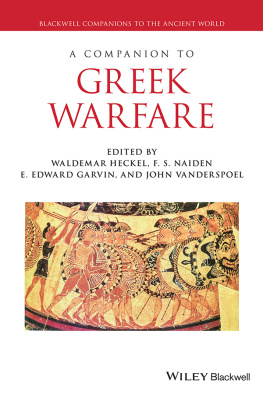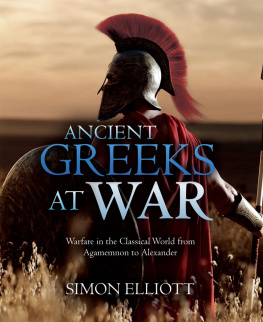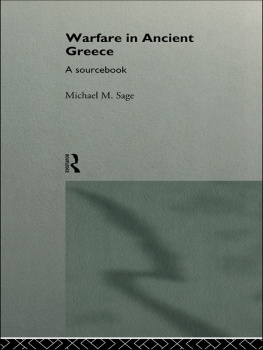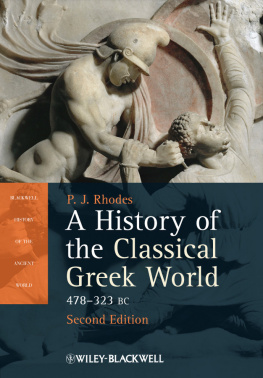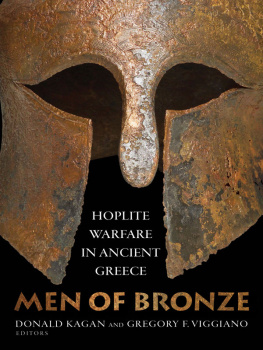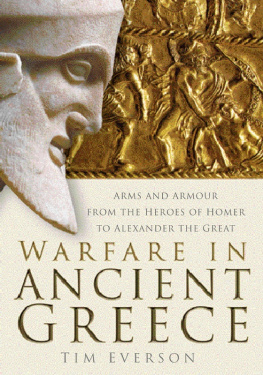GREEK WARFARE
From the Battle of Marathon to the Conquests of Alexander the Great
Lee L. Brice

Copyright 2012 by ABC-CLIO, LLC
All rights reserved. No part of this publication may be reproduced, stored in a retrieval system, or transmitted, in any form or by any means, electronic, mechanical, photocopying, recording, or otherwise, except for the inclusion of brief quotations in a review, without prior permission in writing from the publisher.
Library of Congress Cataloging-in-Publication Data
Greek warfare : from the Battle of Marathon to the conquests of Alexander the Great / Lee L. Brice, Editor.
p. cm.
Includes bibliographical references and index.
ISBN 978-1-61069-069-0 (hbk. : alk. paper) ISBN 978-1-61069-070-6 (ebook) 1. GreeceHistory, MilitaryTo 146 B.C. 2. Military art and scienceGreeceHistoryTo 1500. 3. Military history, Ancient. I. Brice, Lee L.
DF89.B75 2012
355.00938dc23 2012024992
ISBN: 978-1-61069-069-0
EISBN: 978-1-61069-070-6
16 15 14 13 12 1 2 3 4 5
This book is also available on the World Wide Web as an eBook.
Visit www.abc-clio.com for details.
ABC-CLIO, LLC
130 Cremona Drive, P.O. Box 1911
Santa Barbara, California 93116-1911
This book is printed on acid-free paper 
Manufactured in the United States of America
to Keith W. Armatage and Ruth E. Armatage,...
inspirational teachers and friends.
CONTENTS
Introduction
Lee L. Brice
Summer, 2012
Standing as we do in the shadow of the 2,500th anniversary of the Battle of Marathon, it seems a good time to consider the continuing interest in classical Greek warfare. More than two millennia ago, in 490 bce, a Greek army of Athenians and Plataeans stood between a Persian expeditionary force and Athens. The battles result was not a foregone conclusion; the Greeks could have lost. They won, however, so we celebrate their victory, still. We also study the battle and the military history of the period that followed. Indeed, despite all the interest in Alexander the Great, it is not possible to understand his career without considering the development of warfare after Marathon. Despite all the changes that have occurred in warfare, ancient Greek military history continues to attract attention of all sorts. Considering the variety of reasons for this interest can tell us much about the topic I address in this volume.
One overarching reason for interest in Greek warfare is the vitality of the field. Students often joke with me that ancient history should be easy because it is ancient. Like many people, they think it does not change because it is ancient. Given how much warfare has changed they are convinced that the military history of Greek warfare is stuck in an unchanging past. In a way, they are correct. The reasons for this are not hard to locate. Much of what has been written about Greek warfare in the last two centuries has focused heavily on battle narratives and consideration of famous personalities (Brice and Roberts, 2011). This type of military history has carried the label drums and trumpets because of its traditional focus on battle narratives. Much of what we call drums and trumpets style work is stuck in old methods and styles, which is why students who think ancient military history does not change are correct to an extent. Despite that, it remains immensely popular with general readers.
As a type of scholarly history drums and trumpets is often antiquated in its methods. As a result, military history is no longer as popular with academic historians as it was before the mid-20th century. This dismissive attitude by other historians has been the trend for much of the last four decades. The opprobrium is largely because scholars in other fields assume military history is still all drums and trumpets and remain unaware of methodological advances in the study of warfare. The reality is that military history, including the history of ancient warfare, is changing all the time.
Just as historians in other specializations started drawing on new methods and engaging in more social history, post-colonial history, and cultural history after 1945, so did military historians even if they did so a bit later than everyone else. This led to the emergence of a War and Society approach that became increasingly popular. By 1970 historians could refer to a New military history that drew heavily on the social sciences and other fields to consider warfare in new ways. Even traditional or drums and trumpets history has changed thanks to John Keegans Face of Battle (1976). His soldiers perspective approach to the sharp end of battle has affected many discussions of battles and campaigns even in ancient history (Brice and Roberts, 2011). More recently other specialized fields of study have opened up military history. Conflict archaeology, crowd psychology, game theory, and forensic anthropology are examples of fields having an enormous impact on the way historians approach ancient warfare. In these ways we have new topics of detailed study like mutiny, battlefield physiology, and gender as well as new ways of looking at traditional topics like logistics, economics, combat motivation, and death. The result is that military history is more popular in the classroom than it used to be (Wheeler, 2011), but more importantly, this new work has made some drums and trumpets histories much better. It has also had an impact on ancient history.
The methodological changes are just as true of military historians of ancient Greek warfare as of modern warfare. In addition to changes in the field of military history, there have been similar developments in ancient history and classical studies that have changed the way we look at Greek warfare. Archaeologists, for example, uncover new artifacts, sites, and sources such as new inscriptions that illustrate features of Athenian cavalry. Specialists in various fields using new laboratory sciences reveal previously unavailable data including the ways in which particular weapon-use can appear in the skeletal remains of users and victims. Historians employ new ways of looking at old and new evidence to reveal lost information, examine neglected topics, or elaborate new interpretations. As a result, the field of ancient history, including military history, is a far cry from my students misconceptions of it as static; it is an exciting and dynamic field of study that advances constantly and attracts continued interest. While some readers are drawn by activity in the field, others are drawn by the appeal of the content.
A traditional reason for the continuing fascination with ancient military history is the inspirational quality found in famous leaders and battles of the past. Alexander III of Macedon served this function ever since his death, as his epithet the Great demonstrates. Alexander inspired Romans like Pompey, Caesar, and Caracalla. Other Greek generals have provided inspiration to modern readers, even if less so than Alexander, but so have some battles. As can be seen in their titles Richard Billowss book Marathon, How a Battle Changed Western Civilization (2010) and Paul Cartledges Thermopylae: The Battle that Changed the World (2006) some ancient battles have a reputation for inspiration. The Western Tradition still often presents Marathon and Alexanders Persian campaign as triumphs of civilization over barbarians or West over East, while Thermopylae is the first in a tradition of glorious defeats. Tim Roods book American Anabasis (2011) has shown that Xenophons


